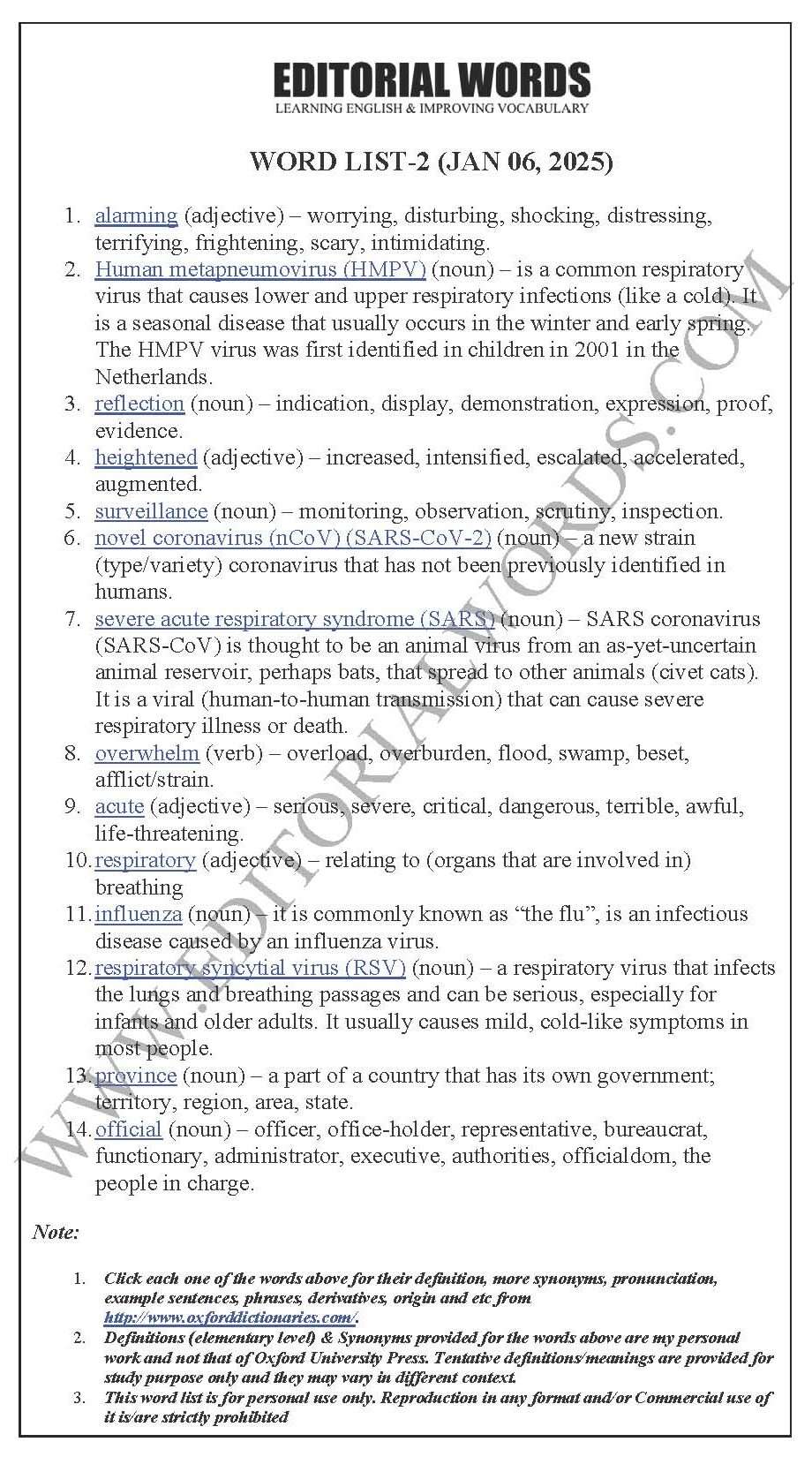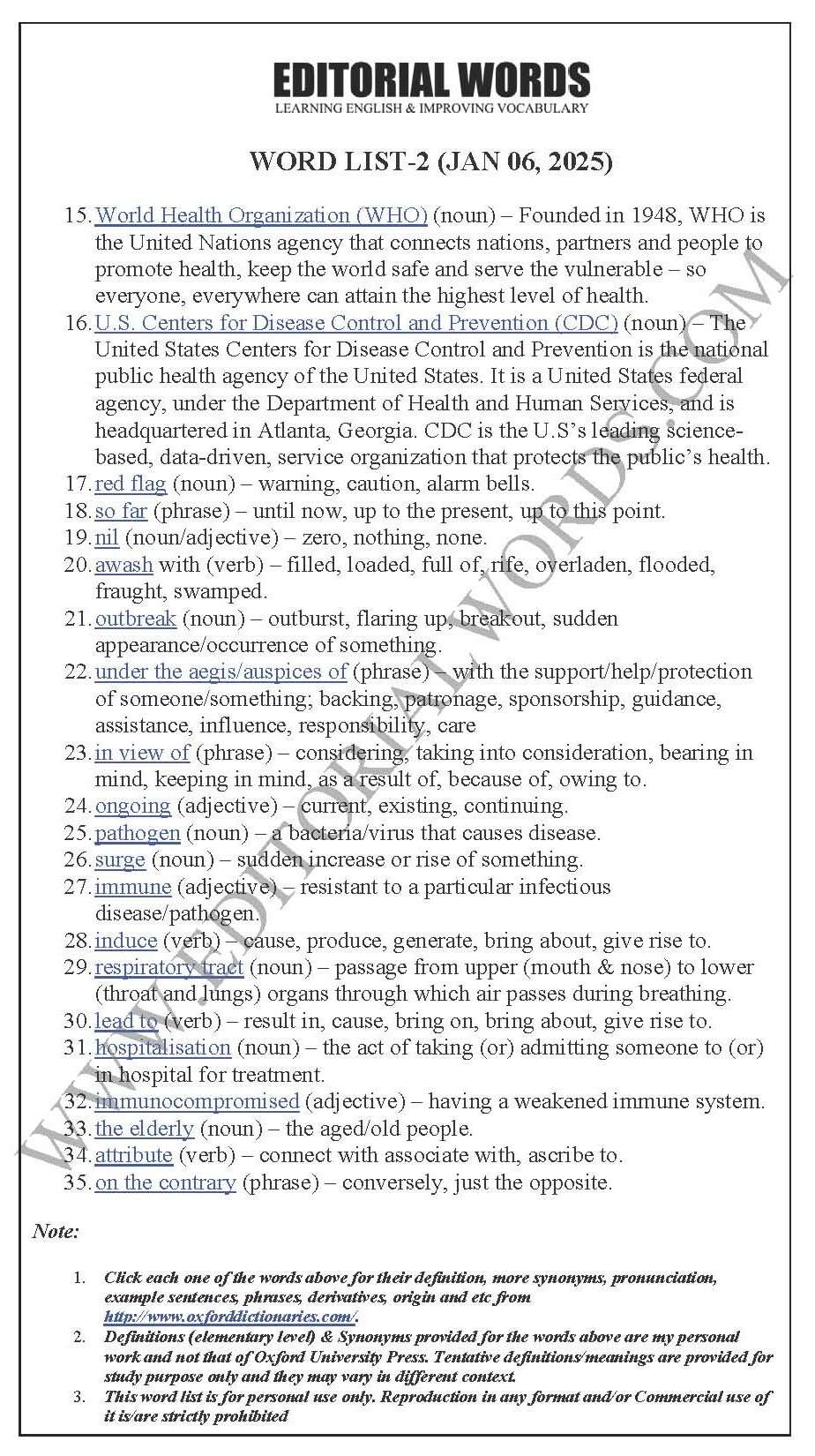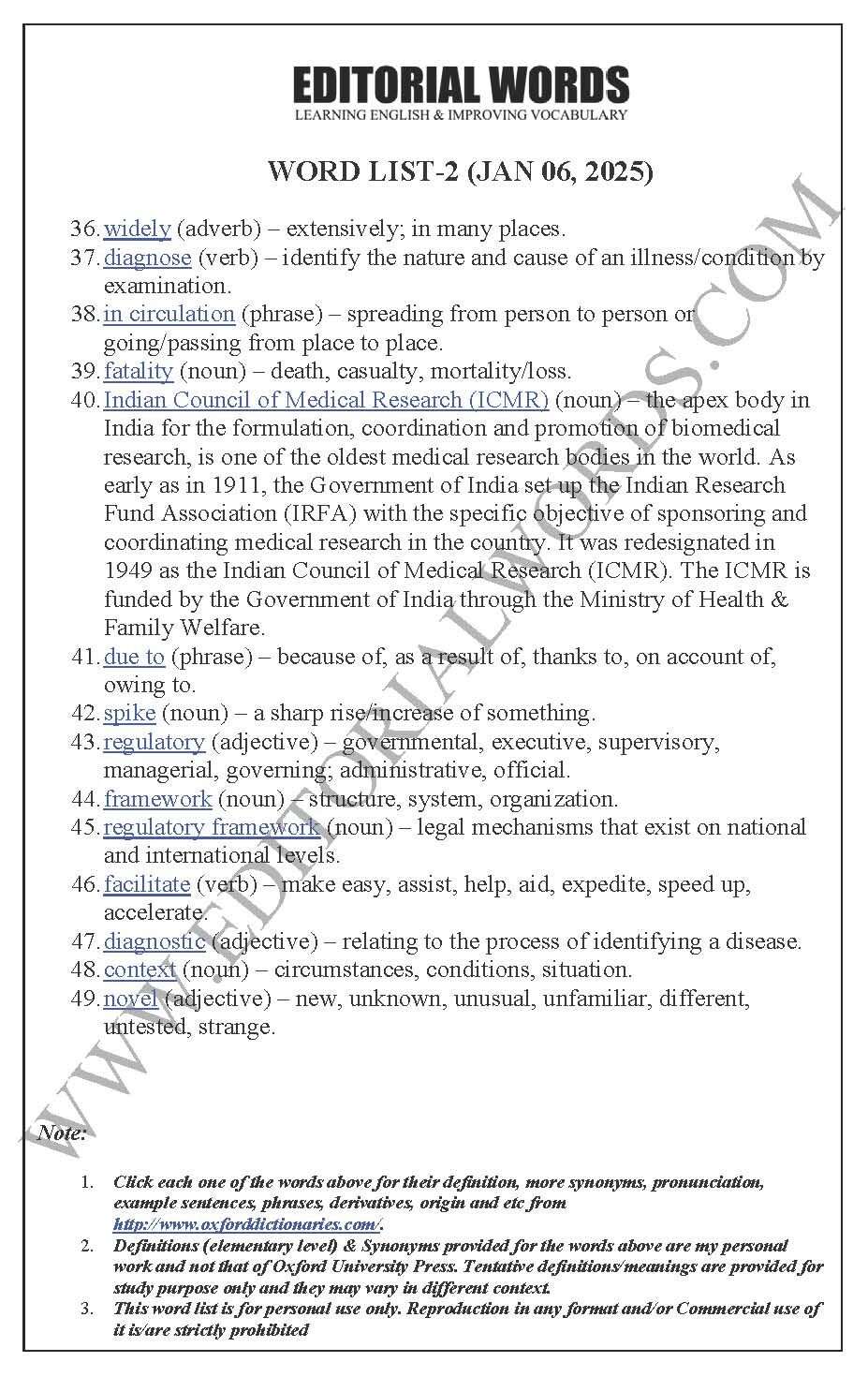The Hindu Editorial (Nothing alarming) – Jan 06, 2025
To read this article, click “The Hindu”.
This preview is provided here with permission.
Courtesy: The Hindu
The Hindu Editorial (Nothing alarming) – Jan 06, 2025:
- alarming (adjective) – worrying, disturbing, shocking, distressing, terrifying, frightening, scary, intimidating.
- Human metapneumovirus (HMPV) (noun) – is a common respiratory virus that causes lower and upper respiratory infections (like a cold). It is a seasonal disease that usually occurs in the winter and early spring. The HMPV virus was first identified in children in 2001 in the Netherlands.
- reflection (noun) – indication, display, demonstration, expression, proof, evidence.
- heightened (adjective) – increased, intensified, escalated, accelerated, augmented.
- surveillance (noun) – monitoring, observation, scrutiny, inspection.
- novel coronavirus (nCoV) (SARS-CoV-2) (noun) – a new strain (type/variety) coronavirus that has not been previously identified in humans.
- severe acute respiratory syndrome (SARS) (noun) – SARS coronavirus (SARS-CoV) is thought to be an animal virus from an as-yet-uncertain animal reservoir, perhaps bats, that spread to other animals (civet cats). It is a viral (human-to-human transmission) that can cause severe respiratory illness or death.
- overwhelm (verb) – overload, overburden, flood, swamp, beset, afflict/strain.
- acute (adjective) – serious, severe, critical, dangerous, terrible, awful, life-threatening.
- respiratory (adjective) – relating to (organs that are involved in) breathing
- influenza (noun) – it is commonly known as “the flu”, is an infectious disease caused by an influenza virus.
- respiratory syncytial virus (RSV) (noun) – a respiratory virus that infects the lungs and breathing passages and can be serious, especially for infants and older adults. It usually causes mild, cold-like symptoms in most people.
- province (noun) – a part of a country that has its own government; territory, region, area, state.
- official (noun) – officer, office-holder, representative, bureaucrat, functionary, administrator, executive, authorities, officialdom, the people in charge.
- World Health Organization (WHO) (noun) – Founded in 1948, WHO is the United Nations agency that connects nations, partners and people to promote health, keep the world safe and serve the vulnerable – so everyone, everywhere can attain the highest level of health.
- U.S. Centers for Disease Control and Prevention (CDC) (noun) – The United States Centers for Disease Control and Prevention is the national public health agency of the United States. It is a United States federal agency, under the Department of Health and Human Services, and is headquartered in Atlanta, Georgia. CDC is the U.S’s leading science-based, data-driven, service organization that protects the public’s health.
- red flag (noun) – warning, caution, alarm bells.
- so far (phrase) – until now, up to the present, up to this point.
- nil (noun/adjective) – zero, nothing, none.
- awash with (verb) – filled, loaded, full of, rife, overladen, flooded, fraught, swamped.
- outbreak (noun) – outburst, flaring up, breakout, sudden appearance/occurrence of something.
- under the aegis/auspices of (phrase) – with the support/help/protection of someone/something; backing, patronage, sponsorship, guidance, assistance, influence, responsibility, care
- in view of (phrase) – considering, taking into consideration, bearing in mind, keeping in mind, as a result of, because of, owing to.
- ongoing (adjective) – current, existing, continuing.
- pathogen (noun) – a bacteria/virus that causes disease.
- surge (noun) – sudden increase or rise of something.
- immune (adjective) – resistant to a particular infectious disease/pathogen.
- induce (verb) – cause, produce, generate, bring about, give rise to.
- respiratory tract (noun) – passage from upper (mouth & nose) to lower (throat and lungs) organs through which air passes during breathing.
- lead to (verb) – result in, cause, bring on, bring about, give rise to.
- hospitalisation (noun) – the act of taking (or) admitting someone to (or) in hospital for treatment.
- immunocompromised (adjective) – having a weakened immune system.
- the elderly (noun) – the aged/old people.
- attribute (verb) – connect with associate with, ascribe to.
- on the contrary (phrase) – conversely, just the opposite.
- widely (adverb) – extensively; in many places.
- diagnose (verb) – identify the nature and cause of an illness/condition by examination.
- in circulation (phrase) – spreading from person to person or going/passing from place to place.
- fatality (noun) – death, casualty, mortality/loss.
- Indian Council of Medical Research (ICMR) (noun) – the apex body in India for the formulation, coordination and promotion of biomedical research, is one of the oldest medical research bodies in the world. As early as in 1911, the Government of India set up the Indian Research Fund Association (IRFA) with the specific objective of sponsoring and coordinating medical research in the country. It was redesignated in 1949 as the Indian Council of Medical Research (ICMR). The ICMR is funded by the Government of India through the Ministry of Health & Family Welfare.
- due to (phrase) – because of, as a result of, thanks to, on account of, owing to.
- spike (noun) – a sharp rise/increase of something.
- regulatory (adjective) – governmental, executive, supervisory, managerial, governing; administrative, official.
- framework (noun) – structure, system, organization.
- regulatory framework (noun) – legal mechanisms that exist on national and international levels.
- facilitate (verb) – make easy, assist, help, aid, expedite, speed up, accelerate.
- diagnostic (adjective) – relating to the process of identifying a disease.
- context (noun) – circumstances, conditions, situation.
- novel (adjective) – new, unknown, unusual, unfamiliar, different, untested, strange.
Note :
1. Click each one of the words above for their definition, more synonyms, pronunciation, example sentences, phrases, derivatives, origin and etc. from http://www.oxforddictionaries.com/.
2. Definitions (elementary level) & Synonyms provided for the words above are my personal work and not that of Oxford University Press. Tentative definitions/meanings are provided for study purposes only and they may vary in a different context.
3. This word list is for personal use only. Reproduction in any format and/or Commercial use of it is/are strictly prohibited.
The Hindu Editorial (Nothing alarming) – Jan 06, 2025:



“Idioms & Phrases” We Learnt Last Week
“Important Definitions” We Learnt Last Week
Recent Word Lists For The Hindu Editorial Articles

Five years after the SARS-CoV-2 virus overwhelmed hospitals in Wuhan, China, acute respiratory diseases caused by viruses including the human metapneumovirus (HMPV) in children and the elderly,… For further reading, visit “The Hindu”. Below is today’s word list-2 for The Hindu Editorial (Nothing alarming) – Jan 06, 2025.